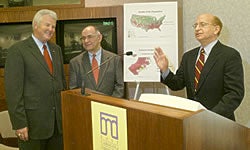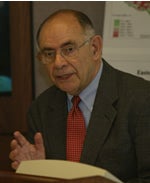ECU lands role in NIH study of weight-loss surgery methods
East Carolina University, building on a national reputation of excellence in bariatric surgery, is one of six centers designated by the National Institutes of Health to work together to develop a deeper understanding of obesity and standards for its surgical treatment.
ECU will receive $1.3 million from the NIH to fund its part of the investigation into one of America’s critical health problems. The NIH is the nation’s premier sponsor of biomedical research.

From left, ECU Interim Chancellor William Shelton, ECU professor of surgery Dr. Walter Pories and Dr. Mike Lewis, ECU vice chancellor for health sciences, announce the university’s participation in a study of surgical treatments for obesity
“Exciting challenges lie ahead for us,” said Dr. Walter J. Pories, the center director at ECU and professor of surgery and biochemistry at the Brody School of Medicine. “This support reflects the desire of the NIH to deal with this important problem.”
The cause for the obesity epidemic remains unknown, but the consequences are severe.
Today, two-thirds of Americans are overweight. Approximately 23 million of those are classified as morbidly obese, meaning they exceed their ideal body weight by 100 pounds. Obesity accounts for at least 300,000 deaths each year, more than seven times as many as motor vehicle collisions.
The six centers will form a consortium that will establish a central database housed at the University of Pittsburgh. Consortium members will meet in early November to plan inter-institutional studies to address the most promising research areas. They include comparisons of the various bariatric (weight-loss) operations; the relationship of muscle, fat, the liver and the intestine to diabetes in the obese patient; social and ethical issues in the management of obesity and obesity surgery; neuropsychiatric implications of the surgery; and nutritional concerns.
One of ECU’s areas of emphasis is Pories’ discovery that obese patients, many of whom have developed diabetes, lose their diabetes within a few days of their weight loss surgery, which reroutes their digestive tracts.
“Not too long ago, diabetes, asthma, high blood pressure and metabolic syndrome were thought to be non-reversible syndromes in morbidly obese patients. It turns out that changes in the plumbing of the gut can reverse them. How does this occur? How does this operation produce these effects? These are complicated questions on a molecular basis. If we figure these questions out, then we won’t have to do surgery,” said Pories, who developed the most widely used version of the gastric bypass in 1978 to 1980 based on a model first suggested by Dr. Edward Mason of the University of Iowa. He is also the immediate past president of the American Society for Bariatric Surgery.

Dr. Walter Pories pioneered a widely used method of gastric- bypass surgery for the treatment of morbid obesity. Photo by Marc Kawanishi
The four other centers in addition to ECU and Pittsburgh are Mt. Sinai Medical Center in New York, University of Washington in Seattle, the Neuropsychiatric Institute in Fargo, N.D., and University of California at Davis. Forty-nine centers sought to participate in the project.
Pories explained each of the six medical centers have particular expertise in an aspect of bariatric surgery and research. ECU’s long-term database of its patients is now a model for bariatric surgery programs around the world. Pories and his team were the first to collect detailed data on each gastric bypass patient, who is followed for life post-surgery. Today, more than 1,720 patients are documented in the database, started in 1978 with the first patient. All of the bypass operations were performed at Pitt County Memorial Hospital.
Dr. Michael J. Lewis, ECU vice chancellor for health sciences, is excited about the possibilities selection in the consortium will allow. “This grant and the work it will support are a perfect fit for our university’s growing stature in understanding the metabolic basis of disease,” he said.